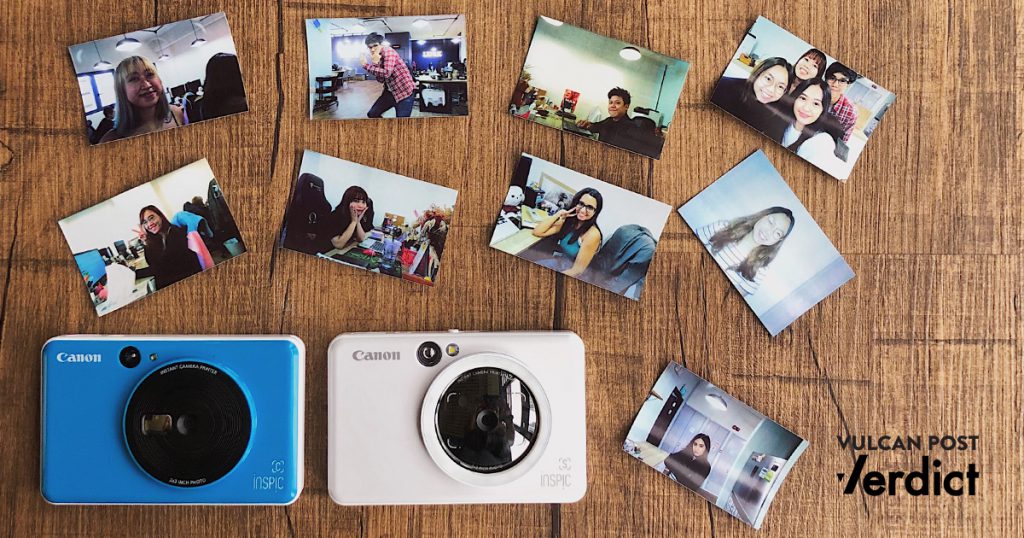Thanks to smartphone cameras, photography is more accessible than it’s ever been — phones at every price point are capable of taking good photos these days, and even the biggest of technophobes know how to whip theirs out to capture a special moment.
The continued rise of digital photography, however, has somewhat tainted the sanctity of physical photographs. Social media is now the preferred way to chronicle memories, and god forbid you develop a roll of film in this day and age without being called a hipster.
In an attempt to bring physical photography back into relevancy, camera companies have started making instant cameras again in recent years. The folks at Canon have jumped on the trend with their new iNSPic cameras, and I embarked on a photo taking spree around the office to find out if they’re an instant hit.
Making Photography Fun Again
The Canon iNSPiC comes in two variants: the iNSPiC [C] and iNSPiC [S]. The entry-level iNSPiC [C] is as basic as basic gets, offering with no additional features apart from taking pictures and the option to reprint your last photo.
The iNSPiC [S], on the other hand, comes with a few more bells and whistles. An LED ring light has been built around the lens to brighten low-light situations, and the accompanying selfie mirror is a welcome addition when it comes to framing your selfies.
The [S] also has a Micro SD slot that can take up to 256GB of storage, and can connect to smartphones via the Canon Print Mobile app to function as a standalone photo printer. Essentially, its an instant camera and photo printer combined into one convenient package.
As far as taking photos go, both cameras operate exactly the same — you point, shoot, and a physical print comes out. Picture quality is as good as you’d expect from an instant camera (read: not very good), but the grainy, washed out aesthetic does have a certain old-school charm to it.
One thing to note is that — as is the case with most instant cameras — you don’t have control over settings like ISO or shutter speed. my experience with taking photos against direct sunlight and fluorescent lights resulted in pretty heavy overexposure, so try to avoid those situations if you can.
When it comes to the iNSPiC [S]’s photo printing capabilities, choosing a well-edited photo isn’t going to improve image quality much. It’ll suffice for a casual memento, as long as you manage your expectations.
The Instax-Shaped Elephant In The Room
I’d be remiss if I reviewed the iNSPiC without mentioning the Fujifilm Instax, the camera that arguably revived the whole instant camera trend in the first place.
But while both the iNSPiC and Instax are instant cameras, it’s not exactly an apples to apples comparison. The key difference between the two lies in the film — the Instax uses its own proprietary film, while iNSPiCs uses the slightly more ubiquitous ZINK paper.
In terms of quality, Instax film is the more premium of the two, feeling significantly sturdier and more polaroid-esque as compared to its ZINK counterpart. ZINK paper can be peeled into a sticker though, so it might be the more suitable choice depending on what you plan to do with your photos.
Another thing to consider is printing speed — while Instax film comes out pretty much instantly and then develops the photo on its own time, the iNSPiC does everything internally. It takes roughly 45 seconds to print a photo — during which you can’t use the camera — so it isn’t the best if you’re trying to capture a series moments in quick succession.
One area where the iNSPiC definitely wins is dimensions — measuring 21.5mm and weighing a mere 188g, it’s smaller than any Instax camera on the market. If you plan on taking your camera with you everywhere you go, this might very well be a deciding factor.
Price-wise, the iNSPiC [C] and [S] retail for S$159 and S$219 respectively, which is about the cost of a mid-range Instax. Something else you need to consider with instant cameras, however, is the price of film — a 20-pack of Instax and Zink film costs S$15.80 and S$14.90 on Lazada respectively. Not a big difference on paper, but the cost does add up if you’re planning on using it regularly.
If I had to pick one, Instax cameras have the slight edge over the iNSPiC when it comes to image quality. As previously mentioned, however, neither are going to win awards for their sharpness, so your choice should depend on the aforementioned factors and what you’re looking for in an instant camera.
The Verdict
If you want to spend less time mulling over the complexities of photography and more time capturing moments, the Canon iNSPiC is certainly worth looking into.
Sure, it’s not a perfect product (an indicator to see how many shots are left would be nice, among other things), but for what it lacks in specs, it more than makes up for in fun.
There’s something very satisfying about holding a physical photo in your hands, and it encouraged me to approach photography in a much more spontaneous way.
Whether you’re using it as a daily driver or creating physical keepsakes for a birthday party (that’s something people do…right?), a compact form factor and functionality make the Canon iNSPiC a viable choice.
You’ll have to evaluate your needs to pick between this and Fujifilm’s Instax cameras, but you honestly can’t go wrong with either.
Header Image Credit: Vulcan Post
